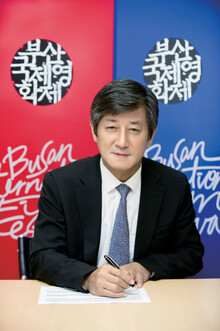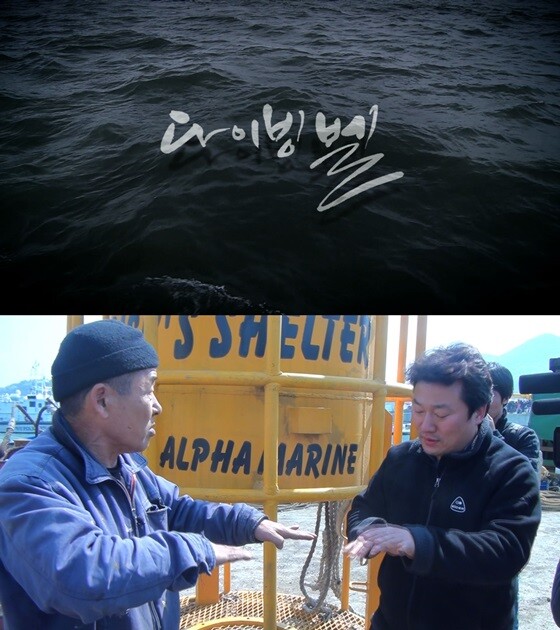hankyoreh
Links to other country sites 다른 나라 사이트 링크
[Editorial] The Busan Film Fest needs government sponsorship, not censorship

On Jan. 23, senior officials from the city of Busan met Lee Yong-kwan, executive chair of the Busan International Film Festival (BIFF), and urged him to step down. The first thing that comes to mind is the controversial effort to censor the documentary “The Truth Shall Not Sink with Sewol” during last year‘s festival. The original Korean title of the film is “Diving Bell.”
After the documentary, which deals with the tragic sinking of the Sewol ferry, was selected to be screened at the festival, Busan Mayor Seo Byeong-soo tried to pressure the festival into pulling the film, expressing concern that it would detract from the festival’s “political neutrality.” The festival organizers, however, held to their position that screening the film as planned was the best way to maintain that neutrality.
The fact that, four months later, the city is trying to force the executive chair to resign without a valid reason is enough to provoke suspicions that this is payback for what happened last year.
These suspicions are reinforced by the flimsy arguments advanced by the city. If Lee is to be abruptly replaced - despite the important role he has played in helping the film festival become one of Asia’s best-known, and despite the fact that one year is left in his tenure as executive chair - there ought to be a good reason for it.

But Busan Metropolitan City is only offering ambiguous reasons. It has cited the need to reform the festival’s organization and staff and to give it a paradigm and vision that will provide the festival with new momentum on its 20th anniversary.
Furthermore, the city belatedly announced the results of an audit of the festival carried out in December of last year, which identified 19 problem areas. While the motivations for the audit are themselves dubious, if problem areas really had been discovered, it is peculiar that the city has not officially held anyone responsible for them.
The city should be ashamed of its furtive attempts to use the audit to pressure Lee into stepping down.
One of the problem areas identified by the city seems to be the allegedly inadequate selection process for films to be screened at the festival. It is at this point that the city‘s grudge about the “Diving Bell” controversy becomes perceptible.
In regard to the selection of films to screen, the festival organizers explain, the cinematic values and vision of the program director must be respected above all else, and indeed all major film festivals operate this way.
Busan Metropolitan City seems to have been anxious to impose the Procrustean standards of bureaucracy on the domain of the arts.
The very fact that Busan Metropolitan City tried to block the screening of “Diving Bell” last year caused serious harm to the festival’s reputation. The city was resorting to censorship - the worst of all methods of suppressing the freedom of expression.
If Busan goes after the executive committee once again as retaliation for its rejection of the city’s censorship demands, it could downgrade the film festival - a point of pride not only for Busan but South Korea as a whole - into a second or third-rate festival.
If Busan truly wants to give the festival new momentum on its 20th anniversary, it should stop using the financial support it provides as an excuse for meddling with the festival and stick to its role as a dependable sponsor that embraces artistic freedom.
Please direct questions or comments to [english@hani.co.kr]

Editorial・opinion
![[Editorial] Penalties for airing allegations against Korea’s first lady endanger free press [Editorial] Penalties for airing allegations against Korea’s first lady endanger free press](https://flexible.img.hani.co.kr/flexible/normal/500/300/imgdb/original/2024/0502/1817146398095106.jpg) [Editorial] Penalties for airing allegations against Korea’s first lady endanger free press
[Editorial] Penalties for airing allegations against Korea’s first lady endanger free press![[Editorial] Yoon must halt procurement of SM-3 interceptor missiles [Editorial] Yoon must halt procurement of SM-3 interceptor missiles](https://flexible.img.hani.co.kr/flexible/normal/500/300/imgdb/child/2024/0501/17145495551605_1717145495195344.jpg) [Editorial] Yoon must halt procurement of SM-3 interceptor missiles
[Editorial] Yoon must halt procurement of SM-3 interceptor missiles- [Guest essay] Maybe Korea’s rapid population decline is an opportunity, not a crisis
- [Column] Can Yoon steer diplomacy with Russia, China back on track?
- [Column] Season 2 of special prosecutor probe may be coming to Korea soon
- [Column] Park Geun-hye déjà vu in Yoon Suk-yeol
- [Editorial] New weight of N. Korea’s nuclear threats makes dialogue all the more urgent
- [Guest essay] The real reason Korea’s new right wants to dub Rhee a founding father
- [Column] ‘Choson’: Is it time we start referring to N. Korea in its own terms?
- [Editorial] Japan’s rewriting of history with Korea has gone too far
Most viewed articles
- 160% of young Koreans see no need to have kids after marriage
- 2Months and months of overdue wages are pushing migrant workers in Korea into debt
- 3[Editorial] Penalties for airing allegations against Korea’s first lady endanger free press
- 4Presidential office warns of veto in response to opposition passing special counsel probe act
- 5Hybe-Ador dispute shines light on pervasive issues behind K-pop’s tidy facade
- 6S. Korea “monitoring developments” after report of secret Chinese police station in Seoul
- 7[Reporter’s notebook] In Min’s world, she’s the artist — and NewJeans is her art
- 8[Exclusive] Hanshin University deported 22 Uzbeks in manner that felt like abduction, students say
- 9All eyes on Xiaomi after it pulls off EV that Apple couldn’t
- 10OECD upgrades Korea’s growth forecast from 2.2% to 2.6%